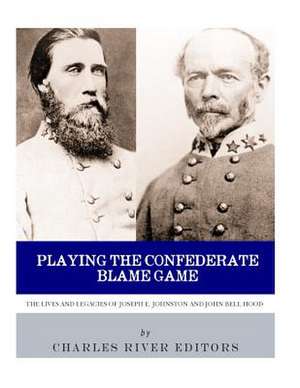Playing the Confederate Blame Game
Autor Charles River Editorsen Limba Engleză Paperback
*Includes maps of the battles they fought in.
*Includes quotes from each general's memoirs describing their participation in battles like Antietam, Gettysburg and the Atlanta Campaign.
*Discusses their relationships with each other and their superiors.
*Includes a Bibliography on each general for further reading.
During the Civil War, one of the tales that was often told among Confederate soldiers was that Joseph E. Johnston was a crack shot who was a better bird hunter than just about everyone else in the South. However, as the story went, Johnston would never take the shot when asked to, complaining that something was wrong with the situation that prevented him from being able to shoot the bird when it was time.
The story is almost certainly apocryphal, but it was aptly used to demonstrate the Confederates' frustration with a man who everyone regarded as a capable general.Johnston would become known more for losing by not winning. Johnston was never badly beaten in battle, but he had a habit of strategically withdrawing until he had nowhere left to retreat.
Johnston and Confederate President Jefferson Davis had a volatile relationship throughout the war, but Johnston was too valuable to leave out of service and at the beginning of 1864 he was given command of the Army of Tennessee. When Johnston gradually retreated in the face of Sherman's massive army (which outnumbered his 2-1) before Atlanta in 1864, Davis removed Johnston from command of the Army of Tennessee and gave it to John Bell Hood.
Hood was one of the most tenacious generals in the Confederacy, for better and worse. The intimidating Texan began to make a name for himself as a brigade commander in the Army of Northern Virginia under new commander Robert E. Lee during the Seven Days Battles in 1862, after which he was promoted to division command. For the next several campaigns, he led a division under General James Longstreet's I Corps., fighting at places like Antietam and Fredericksburg. Hood was in the thick of the action on Day 2 at Gettysburg, suffering a bad wound that left his left arm permanently disabled. When Longstreet's command headed west, Hood suffered another wound at Chickamauga, leading to the amputation of his right leg.
However, his reputation took an extreme hit in the final years of the war. In 1864, Joseph E. Johnston continued to move in the face of Sherman's armies back toward Atlanta, eventually leading to Hood's promotion to command of the Army of Tennessee. At this point, Hood was so damaged by his wounds that he needed assistance to even get on a horse. Nevertheless, Hood aggressively led a series of offensive attacks, failing to dislodge Sherman and only damaging his own army. Sherman eventually took Atlanta anyway. Hood's leadership only got worse during the final months of 1864, culminating in the Franklin-Nashville campaign in which he ordered a massive frontal attack at the Battle of Franklin that left many of his top officers, like Patrick Cleburne, dead on the field. Civil War historian Wiley Ford noted of the campaign, "Never had there been such an overwhelming victory during the Civil War-indeed, never in American military history."
After the war, the two generals wrote memoirs in which they blamed each other for Atlanta and defended their own records against the allegations made by their critics. Playing the Confederate Blame Game chronicles the lives and careers of both men, examines their feuding, and analyzes their lasting legacies. Along with pictures, you will learn about Johnston and Hood like you never have before.
Preț: 131.46 lei
Nou
25.15€ • 26.21$ • 20.83£
Carte disponibilă
Livrare economică 13-27 martie
Specificații
ISBN-10: 198401370X
Pagini: 264
Dimensiuni: 216 x 279 x 14 mm
Greutate: 0.62 kg
